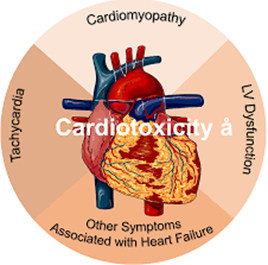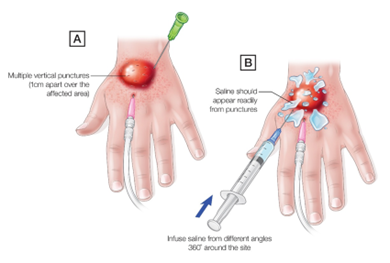A nurse is caring for a client who is receiving doxorubicin, an anthracycline, as part of chemotherapy for breast cancer. The nurse should monitor the client for which of the following adverse effects of doxorubicin that can be reduced by dexrazoxane, a chemoprotective agent? (Select all that apply.)
Bone marrow suppression
Cardiotoxicity
Extravasation injury
Alopecia
Mucositis
Correct Answer : B,C
Choice A reason:
Bone marrow suppression is a common and potentially serious adverse effect of doxorubicin, an anthracycline that intercalates into DNA and inhibits the enzyme topoisomerase II, resulting in DNA damage and cell death. Doxorubicin is used to treat breast cancer, a type of cancer that affects the breast tissue. Bone marrow suppression can cause leukopenia, anemia, and thrombocytopenia, which can increase the risk of infection, bleeding, and fatigue. Dexrazoxane, a chemoprotective agent, does not prevent bone marrow suppression caused by doxorubicin. The nurse should monitor the client's blood counts regularly and provide supportive care as needed.
Choice B reason:
Cardiotoxicity is a rare but serious adverse effect of doxorubicin, an anthracycline that is used to treat breast cancer. Cardiotoxicity can cause acute or chronic heart failure, arrhythmias, and myocardial infarction. Cardiotoxicity is caused by the formation of free radicals that damage the cardiac muscle cells. Dexrazoxane, a chemoprotective agent, can reduce cardiotoxicity caused by doxorubicin. Dexrazoxane is an iron chelator that scavenges free radicals and protects the heart from oxidative stress. The nurse should monitor the client's cardiac function before and during treatment with doxorubicin and administer dexrazoxane as prescribed.
Choice C reason:
Extravasation injury is a rare but serious adverse effect of doxorubicin, an anthracycline that is used to treat breast cancer. Extravasation injury is leakage of the drug into the surrounding tissue, which can cause severe pain, swelling, blistering, necrosis, and ulceration. Extravasation injury is caused by the vesicant property of doxorubicin, which means that it can cause tissue damage if it escapes from the vein. Dexrazoxane, a chemoprotective agent, can reduce extravasation injury caused by doxorubicin. Dexrazoxane can prevent or limit tissue damage by inhibiting the enzyme topoisomerase II in the skin cells. The nurse should monitor the infusion site carefully and stop the infusion immediately if extravasation occurs. The nurse should also administer dexrazoxane as prescribed and follow the institutional protocol for extravasation management.
Choice D reason:
Alopecia is a common and usually mild adverse effect of doxorubicin, an anthracycline that is used to treat breast cancer. Alopecia is hair loss that can affect the scalp, eyebrows, eyelashes, and body hair. Alopecia is caused by the cytotoxic effect of doxorubicin on the hair follicles. Dexrazoxane, a chemoprotective agent, does not prevent alopecia caused by doxorubicin. The nurse should provide emotional support to the client and educate them on how to cope with hair loss, such as using wigs, hats, scarves, or makeup.
Choice E reason:
Mucositis is a common and potentially serious adverse effect of doxorubicin, an anthracycline that is used to treat breast cancer. Mucositis is inflammation and ulceration of the mucous membranes that line the mouth, throat, esophagus, stomach, and intestines. Mucositis can cause pain, difficulty swallowing, nausea, vomiting, diarrhea, and infection. Mucositis is caused by the cytotoxic effect of doxorubicin on the rapidly dividing cells of the mucous membranes. Dexrazoxane, a chemoprotective agent, does not prevent mucositis caused by doxorubicin. The nurse should assess the client's oral cavity regularly and provide oral hygiene as needed. The nurse should also advise the client to avoid spicy, acidic, or hot foods and drinks; use a soft toothbrush; rinse with saline or baking soda solution; and use topical analgesics or mouthwashes as prescribed.


Nursing Test Bank
Naxlex Comprehensive Predictor Exams
Related Questions
Correct Answer is A
Explanation
Choice A reason:
Increasing the number of red blood cells in your blood is the mechanism of action of epoetin alfa, a bone marrow stimulant that is used to treat anemia caused by chemotherapy. Epoetin alfa is a synthetic form of erythropoietin, a hormone that stimulates the production of red blood cells in the bone marrow. Red blood cells are the cells that carry oxygen from the lungs to the tissues and carbon dioxide from the tissues to the lungs. By increasing the number of red blood cells, epoetin alfa can improve the oxygencarrying capacity of the blood and reduce the symptoms of anemia, such as fatigue, weakness, and pallor.
Choice B reason:
Increasing the amount of iron in your blood is not the mechanism of action of epoetin alfa, a bone marrow stimulant that is used to treat anemia caused by chemotherapy. Iron is a mineral that is essential for the synthesis of hemoglobin, a protein that binds oxygen in the red blood cells. Iron deficiency can cause anemia, but it is not the main cause of anemia in clients receiving chemotherapy. Epoetin alfa does not increase the amount of iron in the blood, but it may increase the demand for iron, as more red blood cells are produced. The client may need to take iron supplements along with epoetin alfa to prevent iron deficiency.
Choice C reason:
Increasing the amount of oxygen in your blood is not the mechanism of action of epoetin alfa, a bone marrow stimulant that is used to treat anemia caused by chemotherapy. Oxygen is a gas that is inhaled from the air and diffuses into the blood through the lungs. The amount of oxygen in the blood depends on several factors, such as the atmospheric pressure, the respiratory rate, and the ventilationperfusion ratio. Epoetin alfa does not increase the amount of oxygen in the blood directly, but it can increase the oxygencarrying capacity of the blood indirectly, by increasing the number of red blood cells.
Choice D reason:
Increasing the number of platelets in your blood is not the mechanism of action of epoetin alfa, a bone marrow stimulant that is used to treat anemia caused by chemotherapy. Platelets are cell fragments that are involved in blood clotting and hemostasis. Thrombocytopenia is a condition that causes low platelet count and increases the risk of bleeding. Thrombocytopenia can be caused by chemotherapy, but it is not treated by epoetin alfa. Epoetin alfa does not increase the number of platelets in the blood, but it may increase the risk of thrombosis, as more red blood cells can make the blood more viscous. The client may need to take anticoagulant drugs along with epoetin alfa to prevent thrombosis.
Correct Answer is B
Explanation
Choice A reason:
Cardiotoxicity is not a common adverse effect of cyclophosphamide, an alkylating agent that crosslinks DNA strands and prevents cell division. Cyclophosphamide is used to treat ovarian cancer, a type of cancer that affects the female reproductive organs. Cardiotoxicity may be caused by other drugs, such as anthracyclines and trastuzumab, which are used to treat other types of cancer.
Choice B reason:
Hemorrhagic cystitis is a common and potentially serious adverse effect of cyclophosphamide, an alkylating agent that is used to treat ovarian cancer. Hemorrhagic cystitis is inflammation and bleeding of the bladder, which can lead to infection, obstruction, and renal failure. Hemorrhagic cystitis is caused by the metabolite of cyclophosphamide, acrolein, which irritates the bladder lining. The nurse should administer mesna, a chemoprotective agent, to the client to prevent hemorrhagic cystitis. Mesna binds to acrolein and inactivates it, preventing it from damaging the bladder. The nurse should also encourage the client to drink plenty of fluids and void frequently to flush out the drug and its metabolites.
Choice C reason:
Nephrotoxicity is not a common adverse effect of cyclophosphamide, an alkylating agent that is used to treat ovarian cancer. Nephrotoxicity may be caused by other drugs, such as cisplatin and methotrexate, which are used to treat other types of cancer.
Choice D reason:
Neurotoxicity is not a common adverse effect of cyclophosphamide, an alkylating agent that is used to treat ovarian cancer. Neurotoxicity may be caused by other drugs, such as vincristine and paclitaxel, which are used to treat other types of cancer.
Whether you are a student looking to ace your exams or a practicing nurse seeking to enhance your expertise , our nursing education contents will empower you with the confidence and competence to make a difference in the lives of patients and become a respected leader in the healthcare field.
Visit Naxlex, invest in your future and unlock endless possibilities with our unparalleled nursing education contents today
Report Wrong Answer on the Current Question
Do you disagree with the answer? If yes, what is your expected answer? Explain.
Kindly be descriptive with the issue you are facing.
